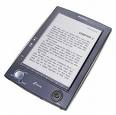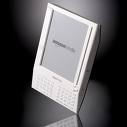So a few months ago I posted about ebooks on the Bookbitch blog. I was an unexpected convert, one of those people who waxed eloquent about the smell of the paper and crack of the spine. But last year I purchased a Sony Reader for my husband to take on a trip to Europe. For months after his return, the Reader sat forgotten in a kitchen drawer.
Then came the day I was packing for a vacation, doing my usual tortured book shuffling, trying to figure out how I was possibly going to bring everything I wanted to read. I remembered the Reader, and decided to give it a whirl—if nothing else, it would free up some room in my suitcase. I was trepidatious, convinced my eyes would tire after a few hours of reading, or that the simulated page turning would prove irritating.
I returned home a convert. I’d read six books in a week, a tiny fraction of what the Reader was capable of holding, all in a device smaller than a trade paperback. No tired eyes, and once I got the hang of it I didn’t even notice that I was reading the books in a completely different format. In fact, turning pages was easier than it would be with a “real” book. I was hooked. In fact, now I own a Kindle too—my husband gave me one for my birthday, so that I’d stop hogging his.
And that got me thinking about what these new electronic readers mean for the future of publishing. Amazon Kindles are flying off the proverbial shelves. There’s a generation of kids who are acclimated to reading everything off a screen. On the opposite end of the spectrum is a generation of baby boomers with aging eyes, and the new readers offer up to six different font sizes, eliminating the need for large format books. As the prices of these devices come down, and more books become available electronically, I foresee them attracting an ever-increasing share of the reading population.
future of publishing. Amazon Kindles are flying off the proverbial shelves. There’s a generation of kids who are acclimated to reading everything off a screen. On the opposite end of the spectrum is a generation of baby boomers with aging eyes, and the new readers offer up to six different font sizes, eliminating the need for large format books. As the prices of these devices come down, and more books become available electronically, I foresee them attracting an ever-increasing share of the reading population.
And you know what? IMHO, this is a good thing. Readers are readers, it doesn’t matter to me whether my books are bound or scrolled across screens. And environmentally speaking, it’s hard to argue with a format that doesn’t destroy any trees, and leaves a negligible carbon footprint.
If I’m correct, it’ll be interesting to see how this changes the publishing landscape. Some people have posited that publishers as a whole will be eliminated, that being able to sell books directly to vendors will eliminate the need for them. Frankly, I don’t think that will happen. Every book needs a good editor (at least, I know that mine have always benefited from having one), and I believe that the publishing houses do tend to provide a filter for what reaches the public. Sales and marketing teams are still necessary to get the titles into the public eye. And every book needs an attractive cover.
But  imagine the savings for them. No longer will they have to gamble when determining a book’s print run. No more remaindering. Every author could potentially earn out their advance. The risks and costs for publishers will be greatly reduced, which might lead to a more even split of the proceeds.
imagine the savings for them. No longer will they have to gamble when determining a book’s print run. No more remaindering. Every author could potentially earn out their advance. The risks and costs for publishers will be greatly reduced, which might lead to a more even split of the proceeds.
Going a step further, imagine what else could change. Recently, to celebrate the release of her latest book, Julia Spencer-Fleming’s publisher offered free downloads of her first novel for a limited time. Brilliant marketing idea, in that it offered the possibility of garnering new readers at little or no cost. Currently, the Kindle offers a free download of the first chapter of every book, then gives you the option of purchasing it. I love that feature, and nine times out of ten I end up buying the book. Which then downloads to the device in a minute or less: instant gratification.
Further down the line, picture interactive book covers. Alternate endings that the readers can choose, or links to backstories on the characters. It could be a brave new reading world.
Of course, there are concerns. Piracy is an issue, one that the music industry has b een grappling with for years. That initially prevented them from seizing opportunities, something that Apple readily exploited by exploding onto the scene with iTunes while major labels were still churning their wheels with outdated marketing models.
een grappling with for years. That initially prevented them from seizing opportunities, something that Apple readily exploited by exploding onto the scene with iTunes while major labels were still churning their wheels with outdated marketing models.
And as a huge fan of independent bookstores, I fear for their demise as much as all of their other supporters. If ereaders really take off, it could prove an insurmountable obstacle for them. I’m hoping it won’t be, because there will always be a need for the kind of knowledge base and informed guidance they do such a wonderful job of providing. But bookstores on a whole will be facing an uphill battle.
Of course, I’m not saying that books will stop being printed entirely. There will probably still be limited editions for collectors and everyone who loves the feel of a real book in their hand. I still buy books, even ones that I’ve already read electronically, when I’ve enjoyed them so much that I couldn’t resist adding them to my shelves. You can’t gift wrap an ebook, and as of right now they’re still not ideal for reading in the tub or at the beach.
course, I’m not saying that books will stop being printed entirely. There will probably still be limited editions for collectors and everyone who loves the feel of a real book in their hand. I still buy books, even ones that I’ve already read electronically, when I’ve enjoyed them so much that I couldn’t resist adding them to my shelves. You can’t gift wrap an ebook, and as of right now they’re still not ideal for reading in the tub or at the beach.
So tell me what you think. Are ebooks the wave of the future? Or have I just fallen under the thrall of my spiffy new Kindle? (Speaking of which, on October 1st one lucky subscriber to my newsletter will win a Kindle and be inducted into the cult. There’s more info on my site if you’re interested).


I’d like to fall under the thrall of a spiffy new Kindle! One author said it was great because the print was large so she could see it. I can’t see out of my glasses!
Don’t tell but I need bifocals.
I don’t think ebooks are the wave of the future as most of the friends I have love to hold books. If this Kindle allows me to read 10or more books faster I’m all for it.
So please…help a visually impaired fan! *g*
Mel K. (on your newsletter list)
Meljprincess AT aol DOT com
Being a techno nerd I haven’t even tried the Kindle but that being said – I’m not a luddite I think the market will diversify and offer readers just even more choice. But will the paperback die a death? – They’ve been predicting that and the end of the novel as we know it for years. I think people who love stories will love getting them any which way they choose. For authors though I think it opens up lots of opportunities to garner reader’s interest and to provide additional stuff to readers – like short story downloads or ‘preview of the next installment’ downloads. My question is when authors have to give so much away for free will the ebook phenomenon change the market such that it’s even harder for authors to make a living?
As long as the ebooks have a button that let you make the print bigger, they would have the advantage of being able to be read at night without a light being left on. I do find that screenreading is more tiring after a while than page reading–I wonder if there is a physiological reason for that?
I’ve sold both to print and to epubs, but have just bought my first ereader. I am a Luddite, a techno-naif and a klutz. Downloading books isn’t all that difficult and reading them is ease itself.
Will print books die out? No, I don’t think so, but they will change, as will the writing/publishing business. Exactly how? I don’t know, can’t even guess, but it’s sure to be interesting.
I think you’re all right, it will be very interesting to see how publishing handles the changes in the horizon. A decade ago, cell phones were still something of a novelty in much of the world, never mind ipods and all of this other technology that has since become ubiquitous. I just spent my vacation virtually thumbing through my kindle, and I can attest that it holds up remarkably well on the beach.